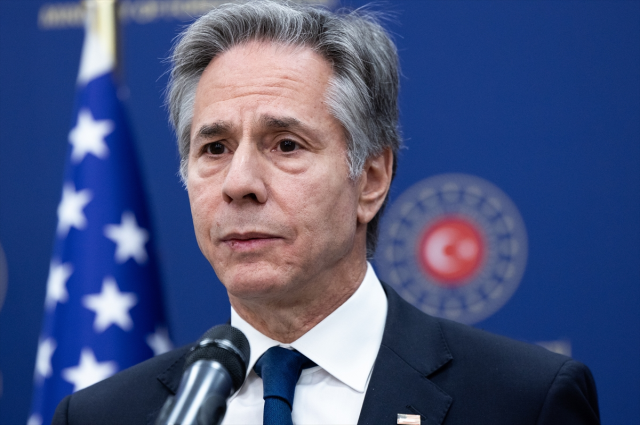|
U.S. Secretary of State Antony Blinken stated that they are following the positive statements of Hayat Tahrir al-Sham (HTS) and announced that U.S. officials could be sent to Syria if concrete steps are taken. Blinken outlined the conditions under which HTS could be removed from the terrorist list. BLINKEN: HTS LEADER'S STATEMENTS ARE POSITIVEIn an interview with Bloomberg News, U.S. Secretary of State Blinken evaluated the current situation in Syria and the transition process in the country. Noting that the statements made by HTS leader Ahmed al-Shara (Abu Muhammad al-Julani) so far have been positive and that the initial steps have also been constructive, Blinken said they primarily expect concrete positive steps to be taken.  U.S. Secretary of State Antony Blinken U.S. Secretary of State Antony BlinkenREMOVAL FROM THE TERRORIST LIST MAY BE ON THE AGENDAStating that they are in direct contact with HTS, Blinken emphasized that the removal of HTS from the "terrorist list" could be on the agenda depending on the constructive steps the organization takes during the transition process in Syria. Blinken remarked, "We have heard positive statements from HTS leader Mr. (Abu Muhammad) al-Julani, but what everyone is focused on is what is actually happening on the ground. Are they working to build an inclusive Syria?" U.S. PREPARING TO MEET WITH HTSHighlighting the importance of establishing "direct communication" with all actors in the country regarding the possibility of sending officials to Syria, Blinken said, "It is important to speak as openly as possible, to listen, and to understand as well as we can the course of the process and where they want to go. Therefore, in the coming days, we will consider the process of sending officials." THEY NEED TO ACT IN AN INCLUSIVE MANNERBlinken stated that if HTS and other groups involved in the administration conduct this process without basing it on sectarian lines, in a way that includes all Syrians, protects the rights of minorities, and does not leave room for terrorist organizations like ISIS, the support of the international community will come quickly. Minister Blinken commented, "If they take these steps and meet the other criteria expected by the international community, I believe we could see a very positive process in terms of recognition and support. This requires HTS and other groups there to act inclusively." The U.S. had completely withdrawn from Syria in 2012 by closing its embassy and pulling out all diplomatic personnel. THE FALL OF THE BA'ATH REGIME IN SYRIAOn November 27, clashes intensified between regime-opposing armed groups and Bashar al-Assad's forces in Syria. The regime-opposing armed groups gained dominance in the largest cities such as Aleppo, Idlib, Hama, and Homs between November 30 and December 7. As groups began to enter the capital Damascus on December 7, with support from the masses, the regime completely lost control in Damascus and many other regions, collapsing on December 8. As the Ba'ath Party's 61-year rule came to an end, regime leader Assad fled to Russia on December 8, which had decided to provide asylum for him and his family. Meanwhile, the Syrian National Army also liberated the center of the Tel Rifaat district from the terrorist organization PKK/YPG on the first day of the Operation Freedom Dawn launched in December. With the liberation of the Manbij district, the region, which had turned into the largest terrorist stronghold west of the Euphrates River, was cleared of PKK/YPG. Following the fall of the Ba'ath regime, a temporary administration was established in Syria, and Muhammad al-Bashir was appointed as the prime minister of the temporary administration until March 2025. Turkey's embassy in Damascus also resumed operations on December 14. After the regime's fall, many Western countries sent delegations to Damascus.
|